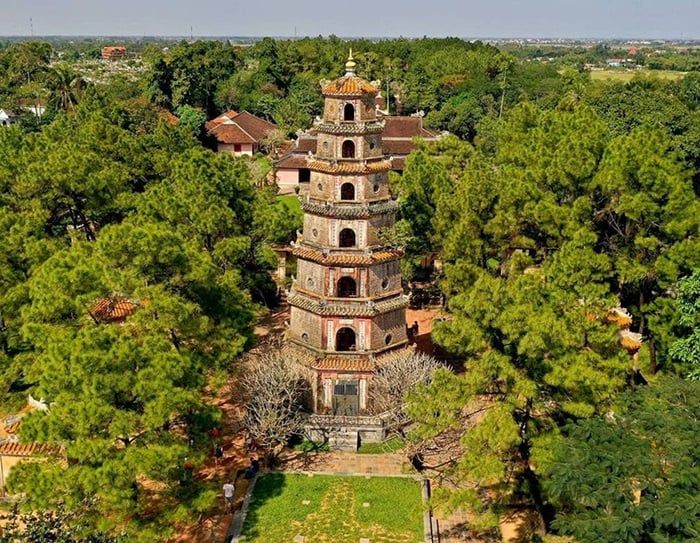Thien Mu Pagoda - Spiritual and Cultural Journey in Hue
Peacefully located on a hill, facing the Perfume River at Hue city, Thien Mu Pagoda is famous for its spiritual beauty, rich history and unique architecture. As an extremely important symbol of Vietnamese culture, this pagoda attracts tourists by the blend of sacredness and architectural sophistication.
History of Thien Mu Pagoda
Thien Mu Pagoda is not only a pagoda, but also an indispensable part of Vietnamese history. Erected in the 17th century, the pagoda has gone through many historical periods and upgrades. Originally built by Lord Nguyen Hoang, Thien Mu Pagoda has become a unique feature of Buddhist culture and beliefs.

Phuoc Duyen Thap with seven floors is the symbol of the pagoda, highlight on the top of the hill. Each floor of the tower represents a human form and demonstrates the sophistication of architectural art during the Nguyen Dynasty. The tower became a symbol of Hue, standing out in front of the Perfume River.
Nine Floors of Linh Linh
Thien Mu Pagoda is not only beautiful in appearance natural beauty but also in the architecture and interior decoration. The high-rise tower not only provides a panoramic view of Hue, but also contains many extremely precious relics. Each floor of the tower contains historical and cultural relics, from ancient ceramics to exquisite sculptures.
The main building of the pagoda, Dai Hung Tu, is a place of worship for Buddha and highlighted by an intact bronze Buddha statue. The lush green trees and the flower-filled front yard of the pagoda amid the pure atmosphere create a sacred space, suitable for those who want to seek tranquility.
Legends and Mysterious
Thien Mu Pagoda not only attracts tourists by its architectural beauty but also by its mysterious legends and stories. One of the most famous stories is about the old lady who foretold the construction of this pagoda.
According to legend, the old lady predicted that a lord would build a building in that place to bring peace to the country.
Architecture Unique
The architecture of Thien Mu Pagoda is not only a symbol of beauty but also a mirror of creativity and architectural art in Vietnamese history. Phuoc Duyen Tower not only stands out with its number of floors but also with its sophisticated sculptures, from winding dragons to peaceful Buddha statues.
Pagoda gates and buildings Other buildings were built with care and sophistication, creating a picture of harmony between architecture and surrounding nature.
Spirituality and Festivals
Thien Mu Pagoda is not only a tourist destination, but also a sacred and sacred place for Vietnamese people. Many traditional Buddhist festivals are held here, attracting a large number of Buddhists and tourists who want to experience the spiritual atmosphere.
One of the famous festivals is the Hoa Binh festival , takes place every full moon day of the third lunar month. This festival is not only an opportunity for Buddhists to participate in spiritual rituals but also an opportunity for the modern community to connect with tradition.
Location and Scenery
Thien Mu Pagoda enjoys a prime location, nestled among lush green hills and overlooking the charming Perfume River. This creates a peaceful and romantic space, perfect for those who want to stay away from the noise of the outside world.
Tourists can enjoy the journey to Thien Mu Pagoda not only thanks to the spiritual experience but also thanks to the trip through the winding roads, ancient trees and gentle people of the surrounding villages.
Conservation Efforts
Thien Mu Pagoda, like many other historical and cultural relics, has gone through many stages of restoration and conservation. The efforts of the local government and community have kept the temple's ancient architecture and spirituality intact over time.
Sustainable tourism and cultural education programs are continuously organized. deploy and share with visitors the preciousness and significance of Thien Mu Pagoda in history and Vietnamese culture.
Thien Mu Pagoda is not only a famous tourist destination in Hue, but also an important spiritual and cultural symbol of Vietnam.
The journey to Thien Mu Pagoda is not only a discovery of unique architecture and profound history, but also an opportunity to experience the spirit of purity and connection with culture. unique culture of this country.



